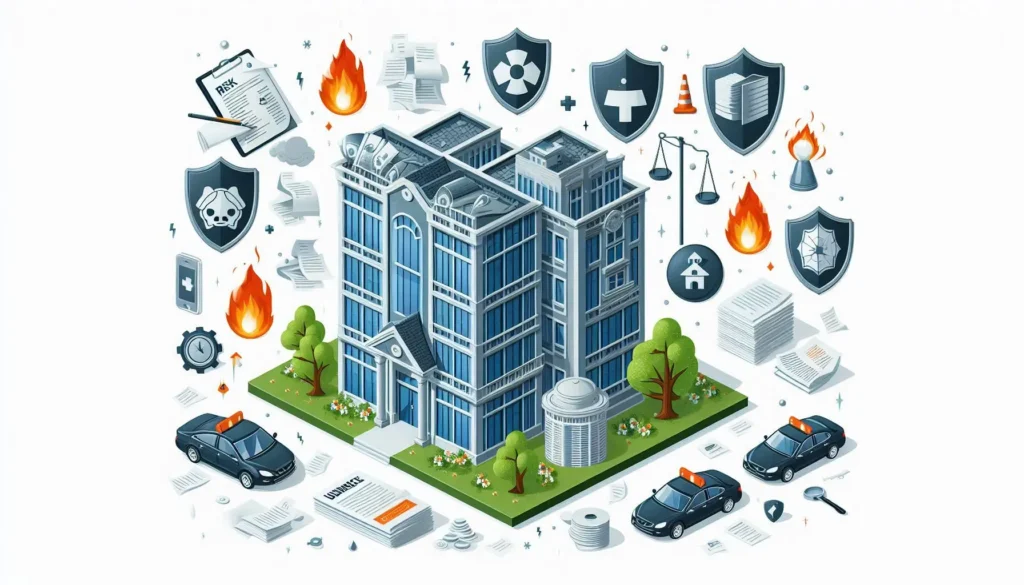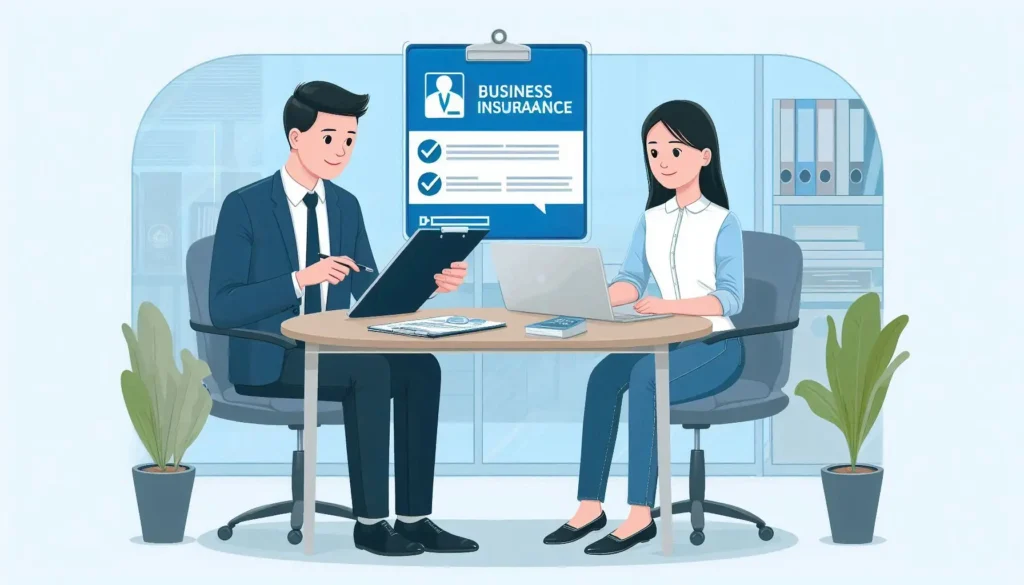When you run a business, unexpected events can happen at any time—from natural disasters to lawsuits to employee injuries. These events can put the survival of your business at risk. That’s where business insurance comes in. Whether you’re a small business owner or the CEO of a large company, business insurance is your safety net, designed to shield your business from potentially devastating financial losses.
1. What is Business Insurance?
Business insurance is a broad term that covers various types of insurance policies designed to protect businesses from financial losses due to risks like lawsuits, property damage, theft, employee injuries, or business interruptions. This form of insurance helps ensure that your business can survive a crisis by covering the costs associated with legal claims, damages, and liabilities.
Imagine if your office caught fire or a customer slipped and injured themselves on your premises. Without insurance, your business would be responsible for all the costs, potentially driving you into debt or forcing you to shut down. Business insurance mitigates that risk, allowing you to focus on running and growing your business.

2. Types of Business Insurance
There are many types of business insurance, each designed to protect different aspects of your business operations. The type of insurance you need will depend on the size of your business, the industry you’re in, and the specific risks you face. Let’s break down some of the most common forms:
2.1 General Liability Insurance
This is the most common type of business insurance. General liability insurance protects your business from claims related to bodily injury, property damage, and advertising injury (like copyright infringement). It’s essential for any business that interacts with the public.
2.2 Commercial Property Insurance
If you own or rent business property—whether it’s an office, warehouse, or storefront—commercial property insurance protects your building, equipment, inventory, and other assets from damage caused by events like fire, theft, or natural disasters.
2.3 Workers’ Compensation Insurance
In most states and countries, if you have employees, you’re legally required to have workers’ compensation insurance. This type of insurance covers medical expenses and lost wages for employees who are injured or become ill due to their job.
2.4 Professional Liability Insurance (Errors & Omissions)
Professional liability insurance is critical for service-based businesses. It covers claims of negligence, mistakes, or failure to deliver promised services. For example, if you’re a consultant and a client sues you for providing bad advice, this policy can cover your legal costs and settlements.
2.5 Commercial Auto Insurance
If your business uses vehicles for deliveries, transportation, or any other purpose, commercial auto insurance is a must. This insurance covers damages or injuries caused by your business vehicles, whether they belong to you or your employees.
2.6 Business Interruption Insurance
When a natural disaster, fire, or other incident forces your business to shut down temporarily, business interruption insurance helps cover lost income and ongoing operating expenses (like rent and salaries).
2.7 Cyber Liability Insurance
With the growing threat of cyberattacks and data breaches, cyber liability insurance has become increasingly important. It covers costs associated with data breaches, including notification costs, legal fees, and even extortion payments if your business is hit by ransomware.
2.8 Product Liability Insurance
If your business manufactures or sells products, this insurance protects you against lawsuits related to product defects or injuries caused by your product.
2.9 Employment Practices Liability Insurance (EPLI)
This covers claims related to wrongful termination, discrimination, sexual harassment, or other employment-related issues brought by employees.
3. Why You Need Business Insurance
You might be wondering, “Do I really need business insurance?” Absolutely. Here are some compelling reasons:
3.1 Legal Protection
In many places, certain types of business insurance are required by law, such as workers’ compensation if you have employees or commercial auto insurance if you use vehicles for business purposes. Failing to have the right insurance could result in hefty fines or legal trouble.
3.2 Customer and Client Trust
Having insurance can increase trust among your customers and clients. It shows them that you are a legitimate, responsible business that’s prepared for the unexpected. Many clients, especially in B2B industries, may even require you to have insurance before working with you.
3.3 Protection Against Lawsuits
Even the most careful businesses can get sued. Whether it’s a customer who slips and falls in your store or a client who claims your service caused them financial harm, lawsuits are a common risk. Without insurance, legal fees and settlements could bankrupt your business.
3.4 Natural Disasters
Floods, earthquakes, fires—natural disasters happen. Business insurance ensures that your business assets, property, and income are protected when disaster strikes. Many businesses that experience significant damage without insurance never recover.
3.5 Employee Safety
Workers’ compensation not only helps cover costs when an employee gets injured, but it also ensures your employees know you value their well-being.
3.6 Business Continuity
If a disaster forces you to shut down temporarily, business interruption insurance helps ensure that your business can survive, by covering lost income and keeping your operations afloat while you rebuild.

4. How to Choose the Right Insurance
Selecting the right insurance can feel overwhelming, but you can make the process easier by following these steps:
4.1 Evaluate Your Risks
Start by identifying the specific risks your business faces. For example, if you own a restaurant, you’re at risk for kitchen fires, food poisoning claims, and slip-and-fall accidents. If you’re in the tech sector, data breaches might be a higher risk.
4.2 Consult an Expert
It’s always a good idea to talk to a licensed insurance broker or agent who understands your industry. They can help you determine what coverages are necessary and how much insurance you need.
4.3 Shop Around
Insurance rates and coverage can vary significantly between providers. Get quotes from multiple insurance companies and compare their offerings.
4.4 Understand Exclusions
Always read the fine print. Many insurance policies have exclusions—things they don’t cover. For example, flood damage is often not covered under standard property insurance and may require a separate policy.
4.5 Consider a Business Owner’s Policy (BOP)
For small businesses, a Business Owner’s Policy (BOP) can be a great option. It bundles general liability and property insurance into a single, often cheaper, policy. You can also add other coverages, such as business interruption or cyber insurance, as needed.

5. Historic Evolution of Business Insurance
Business insurance has a long history dating back to ancient times. Early forms of insurance can be traced back to Chinese and Babylonian traders, who developed strategies to minimize the risks associated with shipping goods over treacherous routes.
In the 17th century, insurance became more formalized in Lloyd’s of London, which began offering marine insurance to merchants. Over time, as businesses became more complex, the need for specialized insurance grew. By the 19th and 20th centuries, business insurance had expanded to cover a wide range of risks, from employee injuries to property damage.
Today, with the rise of technology, new types of insurance, like cyber liability insurance, have emerged to protect businesses from modern risks.
6. Cost of Business Insurance
The cost of business insurance varies widely based on factors like the type of business, the industry, location, and the level of coverage needed. However, here are some rough averages:
- General Liability Insurance: Costs can range from $400 to $1,500 per year, depending on the size and industry of your business.
- Professional Liability Insurance: Costs typically range between $600 and $1,800 per year, especially for service-based industries like consulting or healthcare.
- Workers’ Compensation Insurance: Costs depend on your payroll and the risk of injury in your industry. For example, a construction company will pay more than a retail store.
- Commercial Property Insurance: On average, property insurance costs around $1,000 per year but varies greatly depending on the location, size, and assets of your business.
7. How Claims Work
When something goes wrong and you need to make an insurance claim, the process typically follows these steps:
- File a Claim: Notify your insurance provider as soon as possible. Many insurers offer online claims filing systems to streamline the process.
- Provide Documentation: You’ll need to provide documentation to support your claim. This might include photos, police reports, medical records, or proof of loss.
- Investigation: The insurer will investigate the claim to determine if it’s valid. This could involve sending an adjuster to assess property damage or reviewing legal paperwork for a lawsuit.
- Claim Approval or Denial: Based on their investigation, the insurer will either approve the claim and offer a settlement or deny it.
- Receive Payout: If the claim is approved, you’ll receive your insurance payout to cover the losses, up to your policy limit.
8. Factors That Impact Your Insurance Costs
Several factors determine how much you’ll pay for business insurance, including:
- Industry: High-risk industries like construction or manufacturing often pay higher premiums compared to lower-risk industries like consulting.
- Business Size: Larger businesses with more employees, assets, and locations will likely have higher insurance costs.
- Location: If your business operates in an area prone to natural disasters or high crime rates, your property and liability insurance may cost more.
- Claims History: Businesses with a history of frequent claims may face higher premiums.
- Coverage Amount: The more coverage you need (i.e., higher policy limits), the more your insurance will cost.
9. Tips for Reducing Insurance Costs
- Bundle Policies: Many insurers offer discounts if you purchase multiple policies, such as combining general liability and property insurance into a Business Owner’s Policy (BOP).
- Increase Deductibles: Raising your deductible can lower your premium. However, make sure you can afford the higher out-of-pocket costs if you need to make a claim.
- Implement Safety Measures: Businesses that invest in workplace safety measures, such as installing security systems or providing safety training, may qualify for lower premiums.
- Review Your Coverage Annually: Regularly review your insurance policies to ensure you’re not over-insured or paying for coverage you no longer need.
Some Trusted Comapnies
Here are some of the most well-known and trusted international companies that provide business insurance globally:
1. AIG (American International Group)
- Overview: AIG is one of the largest global insurance companies, offering a wide range of business insurance products including property, casualty, cyber, and professional liability insurance.
- Why Trustworthy: Established in 1919, AIG has a long-standing reputation for reliability and financial strength. They operate in over 80 countries.
2. Chubb
- Overview: Chubb is the world’s largest publicly traded property and casualty insurance company, offering a wide array of business insurance products, from general liability to environmental insurance.
- Why Trustworthy: Known for providing superior claims handling and underwriting, Chubb has operations in 54 countries and territories.
3. Zurich Insurance Group
- Overview: Zurich is a Swiss insurance company providing a broad range of business insurance solutions including property, liability, professional indemnity, and cyber risk insurance.
- Why Trustworthy: Founded in 1872, Zurich operates in over 170 countries and is known for its strong customer service and comprehensive coverage options.
4. Allianz
- Overview: Based in Germany, Allianz offers a wide range of insurance solutions for businesses, including liability, property, and workers’ compensation insurance.
- Why Trustworthy: Allianz operates in over 70 countries and is one of the world’s largest financial services providers, known for its financial stability and extensive global network.
5. AXA
- Overview: AXA is a French multinational insurance firm offering a variety of business insurance solutions including liability, cyber, health, and property insurance.
- Why Trustworthy: AXA is one of the largest insurance companies in the world, operating in over 60 countries with a strong presence in Europe, Asia, and North America.
6. Liberty Mutual
- Overview: Liberty Mutual offers a range of business insurance products, such as property, general liability, and workers’ compensation, with a focus on risk management.
- Why Trustworthy: As a global leader in insurance, Liberty Mutual operates in over 30 countries and is highly rated for its customer service and claims handling.
7. Travelers
- Overview: Travelers is an American insurance company that provides business insurance for small and large businesses, including property, casualty, and cyber insurance.
- Why Trustworthy: Founded in 1853, Travelers is one of the largest commercial insurers in the U.S. and has a reputation for excellent customer service and tailored insurance solutions.
8. Hiscox
- Overview: Hiscox is a leading specialist insurer with a focus on small businesses, providing products such as professional liability, cyber insurance, and errors & omissions insurance.
- Why Trustworthy: Known for its customer-centric approach, Hiscox operates in 14 countries and offers tailored insurance solutions for a wide range of industries.
9. Berkshire Hathaway Specialty Insurance
- Overview: A subsidiary of Warren Buffett’s Berkshire Hathaway, this company offers business insurance products like casualty, property, healthcare liability, and executive risk insurance.
- Why Trustworthy: Backed by Berkshire Hathaway, the company is known for its financial strength, excellent claims service, and custom coverage options.
10. Lloyd’s of London
- Overview: Lloyd’s is not a traditional insurance company but a marketplace where various underwriters provide specialized business insurance products like marine, aviation, property, and cyber insurance.
- Why Trustworthy: With origins dating back to 1688, Lloyd’s is one of the oldest and most respected names in insurance, known for covering unique and high-risk businesses.
11. RSA Insurance Group
- Overview: RSA is a British multinational general insurance company offering various business insurance solutions, including property, liability, and marine insurance.
- Why Trustworthy: RSA operates in over 100 countries and has a strong reputation for providing high-quality commercial insurance for businesses of all sizes.
12. CNA Insurance
- Overview: CNA is an American commercial property and casualty insurance company that provides comprehensive coverage, including cyber, marine, and professional liability insurance.
- Why Trustworthy: With over 120 years of experience, CNA is known for its expertise in commercial insurance and has a strong focus on serving small and mid-sized businesses.
| Company | AM Best Rating | Coverage Capacity | Maximum Issue Age | Policies Offered |
|---|---|---|---|---|
| AIG | A | $100 million+ | 75 | Property, Casualty, Cyber, Professional Liability |
| Chubb | A++ | $100 million+ | 75 | General Liability, Property, Environmental, Cyber |
| Zurich Insurance Group | A+ | $100 million+ | 70 | Property, Liability, Workers’ Compensation, Cyber |
| Allianz | A+ | $100 million+ | 65 | Liability, Property, Health, Cyber |
| Liberty Mutual | A | $100 million+ | 75 | Property, General Liability, Workers’ Compensation |
| Travelers | A++ | $100 million+ | 70 | Property, Liability, Cyber, Workers’ Compensation |
| Hiscox | A | $10 million+ | 60 | Professional Liability, Cyber, General Liability |
| Berkshire Hathaway Specialty Insurance | A++ | $100 million+ | 70 | Property, Casualty, Executive Risk, Cyber |
| Lloyd’s of London | A+ (varies by syndicate) | $50 million+ | Varies by syndicate | Marine, Aviation, Property, Cyber |
| RSA Insurance Group | A | $100 million+ | 65 | Property, Liability, Marine |
| CNA Insurance | A | $100 million+ | 70 | Property, Casualty, Cyber, Professional Liability |
Choosing the Best Business Insurance Company
Selecting the right insurance company for your business is a crucial decision that can impact your financial stability and peace of mind. Here are some key factors to consider when making your choice:
1. Assess Your Insurance Needs
- Identify Risks: Evaluate the specific risks your business faces. Consider factors like industry, location, size, and the nature of your operations.
- Determine Coverage Types: Decide which types of coverage you need—general liability, property, workers’ compensation, professional liability, etc.
2. Research Company Reputation
- Financial Stability: Look for companies with strong ratings from agencies like AM Best, S&P, and Moody’s. A solid financial rating indicates that the insurer can pay out claims.
- Customer Reviews: Check online reviews and testimonials. Look for feedback on claims processing, customer service, and overall satisfaction.
3. Evaluate Coverage Options
- Policy Variety: Ensure the company offers a range of policies that can be tailored to your specific business needs.
- Policy Limits and Exclusions: Review the coverage limits and any exclusions in the policies. Make sure they align with your risk exposure.
4. Consider Premium Costs
- Get Quotes: Obtain quotes from multiple insurers to compare pricing. Ensure you’re comparing similar coverage levels and policy terms.
- Look for Discounts: Inquire about available discounts, such as bundling policies or implementing safety measures that might lower your premiums.
5. Check Claims Process
- Ease of Filing Claims: Research how easy it is to file a claim. Look for companies that offer online claims filing or 24/7 support.
- Claims Handling Reputation: Investigate how quickly and fairly the company processes claims. Customer reviews can provide insight into their claims experience.
6. Assess Customer Support
- Accessibility: Ensure that customer support is readily available. Consider whether they offer support via phone, email, or live chat.
- Expertise: Look for insurers with knowledgeable agents who can help you navigate your options and answer any questions.
7. Evaluate Financial Strength and Stability
- Look for Ratings: Use financial strength ratings from agencies like AM Best to gauge the insurer’s ability to pay claims.
- History and Experience: Consider how long the company has been in business and its experience within your industry.
8. Ask About Customization Options
- Tailored Policies: Some insurers allow you to customize your coverage based on your specific needs. This can provide better protection without overpaying for unnecessary coverage.
9. Seek Recommendations
- Consult Peers: Ask other business owners for recommendations based on their experiences with insurance companies.
- Professional Advisors: Consult with your accountant or financial advisor for their insights on reputable insurance providers.
Common FAQs
Q1: Is business insurance tax-deductible?
Yes, most business insurance premiums are tax-deductible as a legitimate business expense.
Q2: What happens if I don’t have business insurance?
Without insurance, your business is vulnerable to financial losses from lawsuits, property damage, or employee injuries. In some cases, not having required coverage, like workers’ compensation, could result in fines or penalties.
Q3: Does business insurance cover natural disasters?
This depends on your policy. Standard property insurance may cover certain disasters like fires, but you may need separate policies for flood or earthquake coverage.
Q4: Can I customize my business insurance policy?
Yes, most insurers offer customizable policies, allowing you to choose coverage that fits your specific needs.
Q5: How do I know how much coverage I need?
The amount of coverage you need depends on your industry, business size, and risks. A good rule of thumb is to consult with an insurance professional to evaluate your specific needs.
Common Myths About Business Insurance (and the Truth Behind Them)
When it comes to business insurance, there are several misconceptions that can lead to inadequate coverage, financial losses, or a general misunderstanding of what’s truly needed. Let’s debunk some of the most common myths surrounding business insurance.
Myth 1: “My business is too small to need insurance.”
Truth: No business is too small for insurance. Whether you’re running a one-person operation from your home or a small local store, the risks are very real. Even a small incident, like a customer slipping in your store or a client suing for unsatisfactory work, can result in costly lawsuits. In fact, small businesses are often more vulnerable to these financial hits because they have fewer resources to cover legal fees or damages.
Myth 2: “General liability insurance will cover everything.”
Truth: While general liability insurance covers many risks, it doesn’t cover everything. It typically protects against third-party claims like property damage or bodily injury but won’t cover things like employee injuries (you’ll need workers’ compensation for that), professional mistakes (you’ll need professional liability insurance), or damages to your property (which requires commercial property insurance). Business insurance needs are often more comprehensive than just general liability.
Myth 3: “If I work from home, my homeowners insurance will cover my business.”
Truth: Homeowners insurance is not designed to cover business-related risks. If you’re running a business out of your home, you likely need a home-based business insurance policy. Homeowners insurance may cover some aspects, like damage to personal property, but it won’t cover business equipment, client visits, or any lawsuits resulting from your work. You’ll need separate business insurance to ensure full protection.
Myth 4: “Insurance is too expensive, I can’t afford it.”
Truth: The cost of business insurance is often much more affordable than the costs you’d face without it. Many small businesses can get coverage for as little as a few hundred dollars a year, depending on their specific needs. Plus, bundling policies or raising your deductibles can help reduce premiums. Paying for insurance is a small investment compared to the potential financial devastation of a major lawsuit or disaster.
Myth 5: “Once I have a policy, I don’t need to worry about it anymore.”
Truth: Your business is constantly evolving, and your insurance needs can change over time. For example, if you expand your business, hire more employees, or acquire new assets, you may need additional coverage. It’s important to review your policy annually or after any significant changes to ensure you’re not over- or under-insured.
Myth 6: “I don’t need workers’ compensation insurance because I only have a few employees.”
Truth: In most states and countries, workers’ compensation insurance is required as soon as you have employees, even if it’s just one person. This type of insurance protects both you and your employees in the event of a workplace injury. Without it, you could face steep fines and be held personally responsible for any medical costs or lost wages.
Myth 7: “I don’t need cyber insurance because my business isn’t online.”
Truth: Every business, whether online or offline, handles sensitive data—whether it’s customer information, payment details, or business operations data. A cyberattack can happen to any business, large or small, and the costs of a data breach can be astronomical, including legal fees, lost business, and the cost of notifying affected customers. Cyber liability insurance helps cover these risks.
Myth 8: “I only need insurance for physical damage or accidents.”
Truth: Many business risks aren’t physical. Legal disputes over intellectual property, employee discrimination claims, professional mistakes, and even reputational damage can all be covered by specific types of insurance. Business insurance can help protect against intangible risks, which can be just as harmful to your business as physical damage.
Myth 9: “As long as I have some coverage, I’m good.”
Truth: Not all coverage is created equal, and having inadequate insurance can leave gaps that could be devastating in the event of a claim. It’s important to work with an insurance professional to ensure you have the right types of coverage and policy limits for your unique business risks. A cookie-cutter insurance policy may not provide the protection you need.
Myth 10: “Business insurance claims are always denied.”
Truth: While it’s true that some claims get denied, this usually happens because of misunderstandings about what’s covered or failure to meet policy requirements. Denied claims are typically due to policy exclusions, incomplete documentation, or claims outside of the coverage limits. If you understand your policy and follow the proper procedures, most legitimate claims will be paid out without issue.
Conclusion
Business insurance is a critical investment that protects your business from a wide range of risks. From lawsuits and accidents to natural disasters and cyberattacks, insurance is your safety net when things go wrong. By understanding your risks, shopping around for the right policies, and regularly reviewing your coverage, you can ensure that your business remains protected and thriving for years to come.
For More Information and Questions Conatct Us or Comment Below.
What is Health Insurance?
Health insurance is a type of coverage that pays for medical expenses incurred by the insured. It can cover a range of services, including doctor visits, hospital stays, surgeries, prescriptions, and preventive care…readmore
